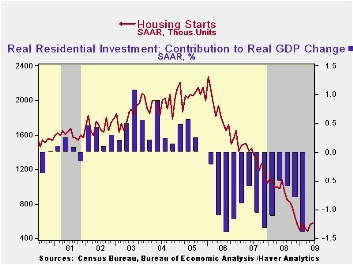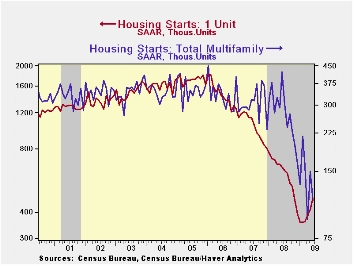 Global| Jul 17 2009
Global| Jul 17 2009U.S. Housing Starts Post A Surprising Gain During June
by:Tom Moeller
|in:Economy in Brief
Summary
Perhaps this is the convincing sign that housing activity has turned the corner from its dramatic decline. Housing starts increased to 582,000 (AR) units last month versus 562,000 starts during May which was revised up from 532,000. [...]

Perhaps this is the convincing sign that housing activity has turned the corner from its dramatic decline. Housing starts increased to 582,000 (AR) units last month versus 562,000 starts during May which was revised up from 532,000. The latest figure greatly exceeded Consensus expectations for 528,000 starts.
Higher starts of single-family homes led the increase in the total last month. The 14.4% m/m rise was the fourth consecutive monthly increase. The gains have been off the record low for the series which dates back to 1959 and the latest level was down three-quarters from the peak in early-2006. During the last ten years, there has been an 84% correlation between the q/q change in single-family starts and their contribution to quarterly GDP growth.
Starts of multi-family homes fell to 112,000 and reversed slightly more than half their gain during May. Starts of apartments, condominiums & town houses remained down by roughly two-thirds from the 2006 peak.
By region increases in starts of single-family units last month spread across the country. Single-family starts in the Midwest rose 26.4% to their highest level since October (-18.0% y/y). In the Northeast, single-family starts also firmed after two months of decline and rose to the highest level this year (-42.4% y/y). Starts in the West rose for the fourth straight month (-22.2% y/y) and in the South single-family starts rose a lesser 8.1% m/m. It was the third straight monthly gain (-34.0% y/y).
Overall, building permits during June remained near the record low. Though the latest gain was the second in a row and to the highest level this year, it still left permits slightly lower than at yearend. Overall, permits were down by roughly one-half from last May. As with starts, recent gains in building permits have been led by higher single-family permits. Single-family permits, a leading indicator of starts, were stronger than the total and rose for the third straight month. They were up 16.2% since December (-28.9% y/y). Permits to build multi-family units rose 18.8% but only after eleven straight months of decline (-76.6% y/y).
The housing starts figures can be found in Haver's USECON database.
Strong Medicine for an Ailing Economy from the Federal Reserve Bank of Atlanta is available here.Productivity Swings and Housing Prices from the Federal Reserve Bank of New York can be found here.
| Housing Starts (000s, SAAR) | June | May | Y/Y | 2008 | 2007 | 2006 |
|---|---|---|---|---|---|---|
| Total | 582 | 562 | -46.0% | 900 | 1,342 | 1,812 |
| Single-Family | 470 | 411 | -28.2 | 616 | 1,036 | 1,474 |
| Multi-Family | 112 | 151 | -73.5 | 285 | 306 | 338 |
| Building Permits | 563 | 518 | -52.0 | 895 | 1,392 | 1,844 |
Tom Moeller
AuthorMore in Author Profile »Prior to joining Haver Analytics in 2000, Mr. Moeller worked as the Economist at Chancellor Capital Management from 1985 to 1999. There, he developed comprehensive economic forecasts and interpreted economic data for equity and fixed income portfolio managers. Also at Chancellor, Mr. Moeller worked as an equity analyst and was responsible for researching and rating companies in the economically sensitive automobile and housing industries for investment in Chancellor’s equity portfolio. Prior to joining Chancellor, Mr. Moeller was an Economist at Citibank from 1979 to 1984. He also analyzed pricing behavior in the metals industry for the Council on Wage and Price Stability in Washington, D.C. In 1999, Mr. Moeller received the award for most accurate forecast from the Forecasters' Club of New York. From 1990 to 1992 he was President of the New York Association for Business Economists. Mr. Moeller earned an M.B.A. in Finance from Fordham University, where he graduated in 1987. He holds a Bachelor of Arts in Economics from George Washington University.
More Economy in Brief
 Global| Feb 05 2026
Global| Feb 05 2026Charts of the Week: Balanced Policy, Resilient Data and AI Narratives
by:Andrew Cates






